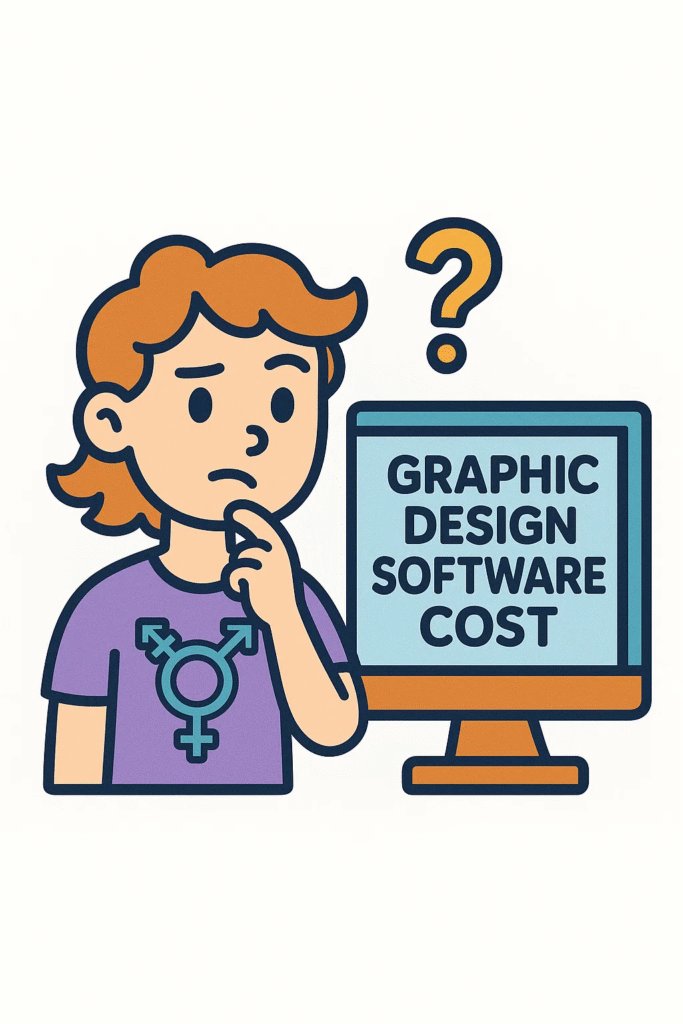Let’s get real — graphic design software isn’t just a creative tool. It’s a recurring cost, a productivity platform, and for many of us in Newcastle NSW, a monthly line item that eats more of our income than coffee and Spotify combined.
Design software in Australia is either subscription-based or one-time purchase. Subscription tools like Adobe Creative Cloud, Canva Pro, and Figma Pro offer updates but incur recurring costs. One-time purchases like Affinity Suite, Procreate, and Sketch are budget-friendly but lack ongoing updates.
Whether you’re a freelance illustrator or a full-blown agency, licensing fees for design software are part of doing business. But what’s fair? What’s bloated? And what do we actually recommend here at Graphic Design Newcastle?
Let’s dig into the tools, the pricing models, and the best bang-for-buck setups for creatives across Australia.
Why Software Licensing Fees Matter to Designers in Australia
Beyond the upfront cost, software licenses affect:
- Project turnaround time — fast tools = fast delivery
- File compatibility — can your team and client open it?
- Scalability — how does this fit your future workload?
In short? The right tool pays for itself. The wrong one becomes dead weight on your balance sheet.
The 10 Most Popular Graphic Design Software Tools (and What They Really Cost)
Adobe Creative Cloud (Photoshop, Illustrator, InDesign & More)
The gold standard. Photoshop, Illustrator, InDesign, After Effects — it’s all here. But it ain’t cheap.
- Cost: $91.99/month (All Apps, single user)
- Best for: Agencies, full-time creatives
- Pros: Industry standard, massive community
- Cons: Pricey, steep learning curve
Affinity Designer, Photo & Publisher
No subscriptions. Just one-time payments. Affinity’s suite rivals Adobe at a fraction of the cost.
- Cost: ~$109 per app, or ~$220 for all three
- Best for: Freelancers, indie creators
- Pros: Fast, modern, affordable
- Cons: Smaller plugin ecosystem
Canva Pro
Australia-born and beloved. Canva makes DIY design simple — brand kits, templates, and one-click exports.
- Cost: $17.99/month (single user), $23.99/month (teams)
- Best for: Social media, startups, marketers
- Pros: Drag-and-drop ease, collaboration
- Cons: Limited control over precision layout
Figma
For interface and product designers, Figma’s where it’s at. Cloud-based, collaboration-first, and constantly evolving.
- Cost: Free (Starter), $12–$45/month (Pro/Org plans)
- Best for: UI/UX teams
- Pros: Real-time teamwork, plugins, community kits
- Cons: Browser-based only (unless you download the desktop app)
Sketch
Mac-only, but mighty. Sketch pioneered vector UI design and remains popular with app developers and SaaS teams.
- Cost: $129/year (single user)
- Best for: Mac-based digital teams
- Pros: Lightweight, intuitive
- Cons: Mac only, fewer collaborative tools than Figma
CorelDRAW
CorelDRAW is a classic. Powerful vector tools, strong print production features, and loyal users worldwide.
- Cost: $499 one-time or $319/year (subscription)
- Best for: Print specialists, signage designers
- Pros: Feature-rich for print
- Cons: Less used in digital-first industries
Procreate
If you’re sketching on an iPad, you’re probably using Procreate. Gorgeous UI and real-time brush performance.
- Cost: $14.99 (one-time)
- Best for: Illustrators, tattoo artists, creatives on the go
- Pros: Affordable, intuitive, fluid performance
- Cons: iPad only, raster-based only (no vectors)
Gravit Designer
Sleek, cross-platform vector software that’s beginner-friendly and affordable.
- Cost: Free version + $49/year Pro
- Best for: Hobbyists, students
- Pros: Cloud integration, multiplatform
- Cons: Not as robust as Illustrator
Inkscape
It’s free, open-source, and surprisingly capable. Inkscape gets you vector tools without the licensing cost.
- Cost: Free
- Best for: Budget-conscious designers
- Pros: Full vector suite, active dev community
- Cons: Dated UI, occasional bugs
GIMP
The free Photoshop alternative. GIMP has come a long way — and while it’s no Adobe killer, it’ll do in a pinch.
- Cost: Free
- Best for: Image editing on a budget
- Pros: Layer-based editing, extensibility
- Cons: Clunky interface, missing pro features
Software Licensing Models Explained
Subscription Licensing
Most modern design tools run on subscriptions — monthly or yearly. Great for regular updates, but recurring costs stack up fast.
One-Time Purchase Models
You pay once, and the software’s yours forever. No updates unless you pay again — but ideal for tight budgets.
- Affinity Suite
- Procreate
- Sketch
Freeware/Open Source Tools
Great for learning and light work. But expect quirks, limitations, and less support.
- GIMP
- Inkscape
- Gravit (free version)
What Graphic Design Newcastle Uses and Recommends
Our Core Tool Stack
At Graphic Design Newcastle, we use:
- Photoshop & Illustrator — for most branding & client work
- Figma — for web & app UI projects
- Canva Pro — for client handoffs and social content
Why? Because it works. It’s fast. It’s standard. And it gets clients what they need.
What We Recommend to Freelancers
- Just starting out? Use Canva Free or try Inkscape.
- Doing logos or print? Go with Affinity Designer.
- Need multi-page layouts? Affinity Publisher or Adobe InDesign.
Tips for Managing Software Costs as a Creative Business
Bundle and Save
Adobe offers team packs, student discounts, and annual bundles. Do the math — yearly plans save heaps over monthly.
Only Pay for What You Need
If you only design social tiles, you don’t need After Effects. Don’t pay for tools you’ll never open.
Track Renewals and Auto-Billing
Set calendar reminders for license renewals. Watch for hidden auto-upgrades or tier changes.
Pay Once, Sub Forever, or Go Free — The Choice is Yours
Graphic design software is like your wardrobe. You need staples, you’ll want luxuries, and sometimes a $20 t-shirt gets the job done.
At Graphic Design Newcastle, we believe in investing in tools that grow with you. Whether you’re all-in on Adobe or building a lean Affinity+Figma stack, just make sure your software supports your creativity — not strangles your wallet.
Want help choosing the right tools for your workflow? We’re always happy to share what works for us (and what doesn’t).

